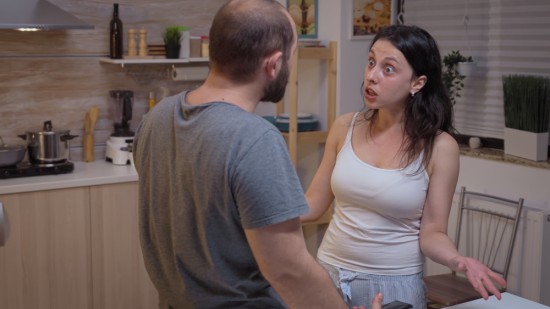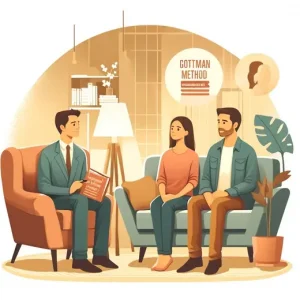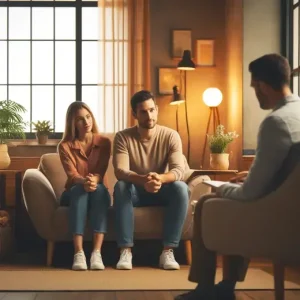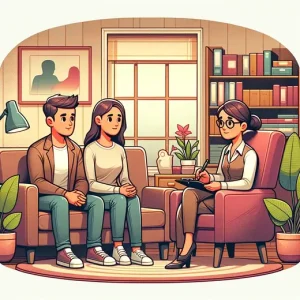Rejections in Relationships | Are you good at Handling Rejections?
By Prapoorna M
Last Updated: November 27, 2021
Life comes with many challenges, and dealing with relationships is a big part of them. In families, we go through a lot of ups and downs, like giving compliments, making excuses, or even facing criticism and rejection from our loved ones, such as our spouses. It’s tough when someone close criticizes or rejects us.
Sometimes, how we respond to these situations can lead to arguments, and not saying anything at all might make things worse. Even if we don’t feel rejected all the time, it can still hurt us deeply. If you find it hard to deal with these problems by yourself, it’s a good idea to talk to a relationship counselor, who can help you work through these issues, either in person or online.
Book Relationship Counselling Now

How to handle Rejection?
Dealing with rejection can be hard, even for the nicest people. Rejection means someone doesn’t agree with our ideas or plans. It’s key to remember that this is just their opinion, and we have our own. Some folks take rejection very personally, feeling as if they are being rejected, not just their ideas. Knowing more about what rejection really is can help us feel better.
A good way to handle rejection is to focus on what makes us special. Sometimes, after being rejected, people get closer to their group or highlight something unique about themselves. This can make the group stronger and ready to stand up for what they believe in, even if others don’t agree. This approach might cause some disagreements, but it also helps make the rejection feel less personal.
Also Read: How to handle Cracks in Marital Relationships
Science of relationships
Every person has emotional attachments. But that attachment styles varies from person to person. Our attachment styles with people exert strong effects on our thinking about others and our relationships with them. Such factors influence important aspects of our behavior on how close we feel with them and reveal our innermost thoughts and share our feelings with them.
These attachment styles can influence the functioning of our brain. When an individual has greater attachments to a person, they show more activation in the parts of brain that are linked to emotion. When they think about any negative outcomes in the relationships such as conflict, breakup or death of their partner, they face the fear of rejection and abandonment due to these links to emotional part of the brain.
Read more: Is there any relationship between Hormones and Anxiety?
Attachment Styles and Responses to Rejection
| Attachment Style | Characteristics | Likely Response to Rejection | Tips for Coping |
|---|---|---|---|
| Secure | High self-esteem and trust in others. Comfortable with intimacy and independence. | Understands and accepts rejection, not taking it personally. Sees it as an opportunity for growth. | Maintain open communication. Reflect on the experience to understand and grow from it. |
| Anxious-Preoccupied | Seeks high levels of intimacy, approval, and responsiveness from partners. Fear of rejection. | Likely to take rejection personally, experiencing significant distress. | Seek support from friends, family, or a counselor. Practice self-soothing and positive self-talk. |
| Dismissive-Avoidant | High value on self-sufficiency; minimal desire for closeness. Dismisses the importance of relationships. | May ignore or suppress feelings related to rejection, pretending it doesn’t affect them. | Acknowledge and express feelings in a healthy way, even if it’s uncomfortable. Seek understanding. |
| Fearful-Avoidant | Mixed feelings about close relationships. Desire for closeness but afraid of getting hurt. | May react unpredictably, with a mix of withdrawing and seeking reassurance. | Work on developing trust in others and self. Therapy can be very beneficial in addressing fears. |
What Rejections can do to us?
This is why it hurts when people we are close to reject our ideas. We feel upset when we’re emotionally distant from loved ones, even if we’re physically close. Emotional distance really affects our peace of mind. When we take rejection personally, it can shake up our inner calm. If we’re already feeling down, a rejection can hit harder, possibly leading to anger. Also, when others reject and exclude us often, it can make us feel even more left out. This can start a cycle of feeling bad and being left out more often.

Rejection in some people initiates hostile cognitive mindset. This mindset activates cognitive structures in our minds that lead us to perceive ambiguous or neutral actions by others as hostile in nature, and to
perceive aggression as common in social interactions and as an appropriate kind of reaction. It is this argument that makes people feel that it is their right to feel aggressive when rejected. Social rejections when followed by hostility might result in aggression that can sometimes change the personality of the person rejected.
Know more: Rebuilding Trust In Relationships
Common Sources of Rejection in Relationships and Strategies for Resolution
| Source of Rejection | Description | Impact on Relationship | Strategies for Resolution |
|---|---|---|---|
| Emotional Unavailability | One partner is consistently distant or unwilling to share feelings, creating a sense of rejection in the other. | Can lead to feelings of loneliness and abandonment. | Practice open communication, initiate regular check-ins, and consider couple’s therapy to foster emotional connection. |
| Sexual Intimacy Issues | Differences in desire or frequency can lead to feelings of rejection. | May cause tension, doubt, and decreased self-esteem. | Communicate openly about needs and preferences, seek professional advice if necessary, and explore new ways to connect physically and emotionally. |
| Prioritizing Outside Interests | When one partner seems to prioritize work, hobbies, or other interests over the relationship. | Leads to feelings of being undervalued or neglected. | Schedule regular quality time together, discuss the importance of balance, and ensure both partners’ needs are met. |
| Differences in Parenting Styles | Conflicting ideas on raising children can result in feelings of rejection or undermining. | Can create conflict and stress, affecting the entire family dynamic. | Engage in open discussions to find common ground, consider parenting classes, and respect each other’s viewpoints. |
| Financial Decisions and Disagreements | Disagreements over spending, saving, or financial goals can feel like a rejection of values or security. | May erode trust and cooperation. | Set clear financial goals together, create a budget that respects both partners’ priorities, and consider financial counseling. |
Understanding Rejection and Its Effects
Rejection can be harmful to both individuals and society. Feeling jealous when rejected is common because it can make us feel bad about ourselves. Rejection can also lead to loneliness. If we’re afraid of being rejected, we might not want to be around others. This can make us feel even more alone.
The Impact of Past Rejections
There’s a theory called “excitation transfer theory.” It says that the way we feel in one situation can affect how we feel in another, later on. For example, if we were often rejected as children, we might become very shy or keep to ourselves more as we grow up.
Seeking Support
If you’re finding it hard to deal with rejection in your relationships, or if you feel like your relationship is in trouble, talking to a mental health professional might help. Wellness Hub has a team of caring, understanding, and open-minded professionals ready to help. You can go to Wellness Hub’s website and book a time to talk to someone today.
Conclusion
In short, dealing with rejection in relationships is tricky but important. It’s key to remember that being rejected by someone, like a partner or a friend, doesn’t mean you’re not valuable. It’s just that people have different views and wants. Rejection can really affect our feelings because of how our brains are wired and our emotional connections with others. But, if we start seeing rejection as just a normal part of dealing with people and not something that attacks our character, we can handle it better. It helps to know what makes us unique and understand our emotional patterns to lessen the sting of rejection and build stronger, more positive relationships.
It’s also very important to get help when dealing with rejection gets tough, especially in close relationships. Wellness Hub is a great place for support. They have a caring team ready to help you work through these hard times. They offer a safe space to talk about your feelings and learn how to deal with rejection. By reaching out to places like Wellness Hub, you can get the help you need to make your relationships better and take care of your emotional health. This way, you can face life’s ups and downs in a healthier, more confident way.
Frequently Asked Questions:
1. What is the best way to handle rejection in a relationship?
Handling rejection involves understanding that it’s not a personal attack but a difference in perspective. Emphasizing your unique identity and not taking rejection as a reflection of your worth can help manage its impact. Seeking support from relationship counseling services like Wellness Hub can also provide guidance and strategies for coping.
2. How does rejection affect our emotional well-being?
Rejection can activate emotional centers in the brain, leading to feelings of fear, abandonment, and distress. Recognizing the role of attachment styles in our reactions to rejection can help us mitigate these effects and maintain emotional balance.
3. Can rejection lead to aggression?
Yes, for some individuals, rejection can initiate a hostile cognitive mindset, making ambiguous actions by others seem hostile and leading to aggression. Understanding this reaction and seeking constructive ways to cope is crucial for personal and societal well-being.
4. How does the fear of rejection influence our behavior?
The fear of rejection can lead to avoidance behaviors, such as social withdrawal or becoming overly cautious in expressing oneself. This fear, rooted in past experiences, can affect one’s ability to form and maintain close relationships.
5. What role does Wellness Hub play in managing rejection in relationships?
Wellness Hub offers professional support for individuals struggling with rejection in relationships. Their team of empathetic and experienced counselors can provide strategies for coping, improving communication, and strengthening emotional resilience, contributing to healthier relationships and emotional well-being.
6. How can understanding attachment styles help in dealing with rejection?
Understanding your attachment style can offer insights into how you perceive and react to rejection. This awareness can help in developing healthier coping mechanisms and in fostering more secure and fulfilling relationships.
7. What is excitation transfer theory and how does it relate to rejection?
Excitation transfer theory suggests that arousal from one situation can intensify emotional reactions in subsequent situations. This theory helps explain why rejections, especially those experienced in childhood, can have long-lasting emotional impacts, influencing behavior and self-expression in adulthood.
8. How can one differentiate between personal rejection and rejection of an idea or proposal in relationships?
Understanding the difference involves recognizing that rejection often pertains to a specific idea, plan, or expectation, rather than a judgment of one’s character or worth. Clear communication and seeking clarification can help distinguish between these types of rejections, reducing the tendency to take things personally and facilitating a more constructive response.
9. Why is it important to not take rejection personally in relationships?
Taking rejection personally can lead to decreased self-esteem, emotional distress, and a cycle of negative interactions. Recognizing that rejection is often about situational factors, differences in opinion, or incompatible desires—not a measure of personal value—can help maintain self-confidence and open the door to growth and healthier relationships.
10. How does Wellness Hub support individuals dealing with rejection in their relationships?
Wellness Hub supports individuals through access to relationship counselors who offer empathetic, friendly, and non-judgmental support. They provide strategies for effectively dealing with rejection, improving communication skills, and enhancing emotional resilience, which can lead to more satisfying and stable relationships. Their approach is geared towards understanding personal reactions to rejection and developing healthier coping mechanisms.
About the Author:
Prapoorna Mangalampalli
M.Sc., M.A., (Dual Masters in Psychology & English) – Counselor (6+ years of experience)
Prapoorna armed with a passionate dedication fueled by dual Master’s degrees in Psychology and English, Prapoorna sheds light on and elevates human experiences. Over 6+ years of experience fuel her insightful approach to counseling, offering profound empathy and guidance across diverse areas like online, marital, relationship, child, family, and career counseling.
At Wellness Hub, she thrives in a team environment that values innovation, compassion, and achieving results for their clients.
Connect with Prapoorna to learn how she can help you or your loved one find their voice and build a brighter future.
Book your Free Consultation Today
Parent/Caregiver Info:
Client’s Details:
* Error Message









